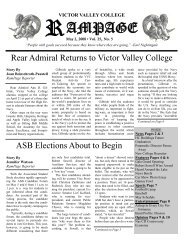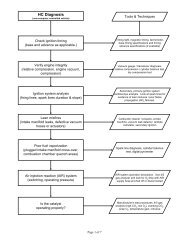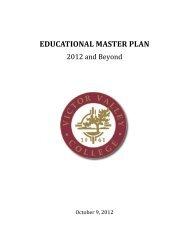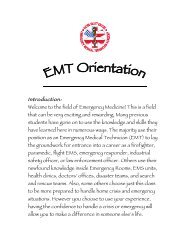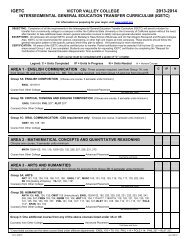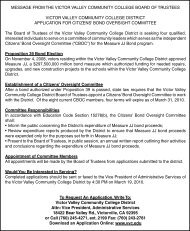Download - Victor Valley College
Download - Victor Valley College
Download - Victor Valley College
Create successful ePaper yourself
Turn your PDF publications into a flip-book with our unique Google optimized e-Paper software.
PROGRAMS / COURSE DESCRIPTION<br />
LEVEL III: SITE SUPERVISOR (PRE SCHOOL)<br />
CERTIFICATE OF ACHIEVEMENT<br />
Units Required: 60.0<br />
This certificate satisfies all EDUCATIONAL<br />
requirements for the Site Supervisor Permit, issued by<br />
the State of California. This permit qualifies one to hold<br />
positions at the Site Supervisor level in State and<br />
Federally Funded programs such as Head Start and<br />
State Preschool. (See note below for information on<br />
how to obtain the EXPERIENCE requirements.)<br />
Certificate Requirements Include:<br />
ALL of the courses required for the Associate of<br />
Science Degree in Child Development including:<br />
Child Development Courses: CHDV 100, 106, 110, 142,<br />
150, 160, 200, 210<br />
CHDV 220, 239, and 240<br />
All coursework must be completed with a grade of “C” or<br />
better.<br />
PLEASE NOTE: Prior to applying for the Site<br />
Supervisor Permit, student must complete a Verification<br />
of Experience, documenting 350 days of work in an<br />
early childhood program of 3+ hours per day within 4<br />
years including at least 100 days of supervising adults.<br />
(Permit applications can be obtained through the Child<br />
Development Department.)<br />
Associate Degree<br />
To earn an Associate Degree in Science with a major in<br />
Child Development, complete CHDV 100, 106, 110,<br />
142, 150, 160, 200, 210, and meet all other <strong>Victor</strong> <strong>Valley</strong><br />
<strong>College</strong> Associate Degree graduation requirements.<br />
21 General Education Units as required for the AS<br />
Degree (CHDV 100 and 146 cannot be used to satisfy<br />
the Social and Behavioral Science requirement).<br />
Transfer<br />
To pursue a bachelor’s degree in this field, here are<br />
some schools that have programs that might interest<br />
you. For the most up-to-date information on these<br />
programs and others, visit www.assist.org. Please stop<br />
by the Transfer Center in Building 55 or make an<br />
appointment with a counselor if you have questions.<br />
• California State University, San Bernardino<br />
Human Development major<br />
For information, you may wish to contact CSUSB’s<br />
Human Development department at (909) 537-5570.<br />
• University of California, Riverside<br />
Human Development major<br />
Local Bachelors Programs<br />
For information on the following programs located in the<br />
High Desert, please visit: www.vvc.edu/offices/<br />
guidance and counseling/ and select “Counseling<br />
Information Sheets”:<br />
• Azusa Pacific University, High Desert Regional<br />
Center<br />
Human Development major<br />
• Brandman University, <strong>Victor</strong> <strong>Valley</strong> Campus<br />
Early Childhood Development major<br />
• University of La Verne, High Desert Campus<br />
Child Development major<br />
CHILD DEVELOPMENT COURSES<br />
CHDV 50 WORKING WITH YOUNG CHILDREN<br />
Units: 3.0 - 48-54 hours lecture. (No prerequisite.<br />
Pass/No pass)<br />
This survey course provides an introduction to early<br />
childhood education. Classroom instruction and<br />
practical experiences will include child development,<br />
child guidance, health and safety issues and curriculum<br />
exploration. This course will provide a foundation for<br />
continued course work in the field.<br />
CHDV 100 CHILD GROWTH AND DEVELOPMENT<br />
Units: 3.0 - 48-54 hours lecture. CSU,UC. (No<br />
prerequisite. Recommended preparation: Successful<br />
completion of ENGL 50 or eligibility for ENGL 101.0 is<br />
strongly advised.)<br />
The course examines the major physical, psychosocial,<br />
and cognitive/language developmental milestones for<br />
children, both typical and atypical, from conception<br />
through adolescence. There will be an emphasis on<br />
interactions between maturational processes and<br />
environmental factors. While studying developmental<br />
theory and investigative research methodologies,<br />
students will observe children, evaluate individual<br />
differences and analyze characteristics of development<br />
at various stages.<br />
CHDV 106 CHILD, FAMILY AND COMMUNITY<br />
Units: 3.0 - 48-54 hours lecture. CSU, UC. (No<br />
prerequisite. Recommended preparation: Successful<br />
completion of ENGL 50 or eligibility for ENGL 101.0 is<br />
strongly advised).<br />
The scientific study of societal institutions which<br />
socialize the child, such as the family, school, peer<br />
group, community and media within the context of<br />
culture, religion, economics, politics and change. Major<br />
theoretical perspectives will be examined.<br />
CHILD DEVELOPMENT<br />
2012-2013 <strong>Victor</strong> <strong>Valley</strong> <strong>College</strong> Catalog 161



